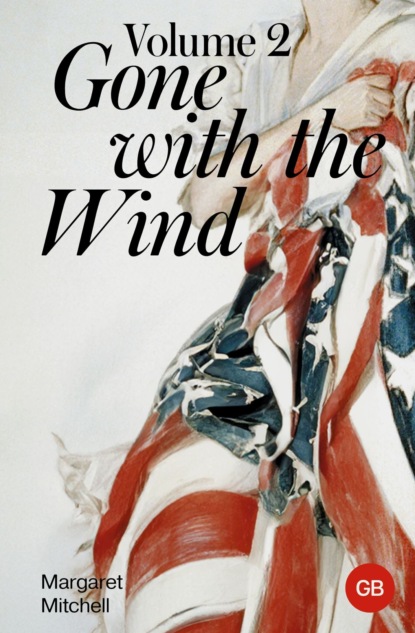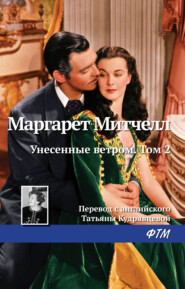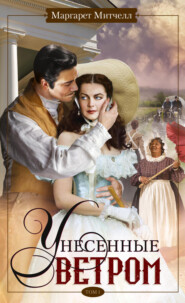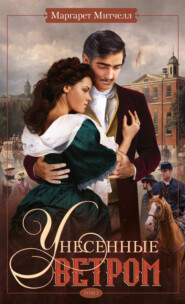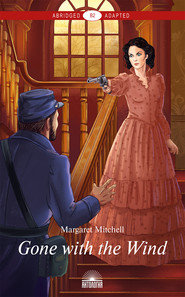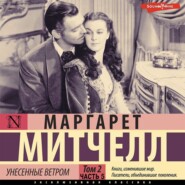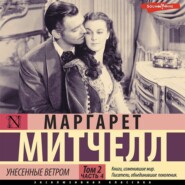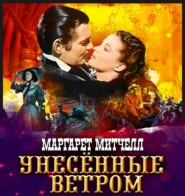По всем вопросам обращайтесь на: info@litportal.ru
(©) 2003-2024.
✖
Gone with the Wind. Volume 2 / Унесенные ветром. Том 2
Настройки чтения
Размер шрифта
Высота строк
Поля
“Oh, yes, you will. You are just putting on this indignant front because you think it's proper and respectable. May I sit down?”
“No.”
He sank into a chair beside her and grinned.
“I hear you couldn't even wait two weeks for me,” he said and gave a mock sigh. “How fickle is woman!”
When she did not reply he continued.
“Tell me, Scarlett, just between friends-between very old and very intimate friends-wouldn't it have been wiser to wait until I got out of jail? Or are the charms of wedlock with old Frank Kennedy more alluring than illicit relations with me?”
As always when his mockery aroused wrath within her, wrath fought with laughter at his impudence.
“Don't be absurd.”
“And would you mind satisfying my curiosity on one point which has bothered me for some time? Did you have no womanly repugnance, no delicate shrinking from marrying not just one man but two for whom you had no love or even affection? Or have I been misinformed about the delicacy of our Southern womanhood?”
“Rhett!”
“I have my answer. I always felt that women had a hardness and endurance unknown to men, despite the pretty idea taught me in childhood that women are frail, tender, sensitive creatures. But after all, according to the Continental code of etiquette, it's very bad form for husband and wife to love each other. Very bad taste, indeed. I always felt that the Europeans had the right idea in that matter. Marry for convenience and love for pleasure. A sensible system, don't you think? You are closer to the old country than I thought.”
How pleasant it would be to shout at him: “I did not marry for convenience!” But unfortunately, Rhett had her there and any protest of injured innocence would only bring more barbed remarks from him.
“How you do run on,” she said coolly. Anxious to change the subject, she asked: “How did you ever get out of jail?”
“Oh, that!” he answered, making an airy gesture. “Not much trouble. They let me out this morning. I employed a delicate system of blackmail on a friend in Washington who is quite high in the councils of the Federal government. A splendid fellow-one of the staunch Union patriots from whom I used to buy muskets and hoop skirts for the Confederacy. When my distressing predicament was brought to his attention in the right way, he hastened to use his influence, and so I was released. Influence is everything, and guilt or innocence merely an academic question.”
“I'll take oath you weren't innocent.”
“No, now that I am free of the toils, I'll frankly admit that I'm as guilty as Cain. I did kill the nigger. He was uppity to a lady, and what else could a Southern gentleman do? And while I'm confessing, I must admit that I shot a Yankee cavalryman after some words in a barroom. I was not charged with that peccadillo, so perhaps some other poor devil has been hanged for it, long since.”
He was so blithe about his murders her blood chilled. Words of moral indignation rose to her lips but suddenly she remembered the Yankee who lay under the tangle of scuppernong vines at Tara. He had not been on her conscience any more than a roach upon which she might have stepped. She could not sit in judgment on Rhett when she was as guilty as he.
“And, as I seem to be making a clean breast of it, I must tell you, in strictest confidence (that means, don't tell Miss Pittypat!) that I did have the money, safe in a bank in Liverpool.”
“The money?”
“Yes, the money the Yankees were so curious about. Scarlett, it wasn't altogether meanness that kept me from giving you the money you wanted. If I'd drawn a draft they could have traced it somehow and I doubt if you'd have gotten a cent. My only hope lay in doing nothing. I knew the money was pretty safe, for if worst came to worst, if they had located it and tried to take it away from me, I would have named every Yankee patriot who sold me bullets and machinery during the war. Then there would have been a stink, for some of them are high up in Washington now. In fact, it was my threat to unbosom my conscience about them that got me out of jail. I-”
“Do you mean you-you actually have the Confederate gold?”
“Not all of it. Good Heavens, no! There must be fifty or more ex-blockaders who have plenty salted away in Nassau and England and Canada. We will be pretty unpopular with the Confederates who weren't as slick as we were. I have got close to half a million. Just think, Scarlett, a half-million dollars, if you'd only restrained your fiery nature and not rushed into wedlock again!”
A half-million dollars. She felt a pang of almost physical sickness at the thought of so much money. His jeering words passed over her head and she did not even hear them. It was hard to believe there was so much money in all this bitter and poverty-stricken world. So much money, so very much money, and someone else had it, someone who took it lightly and didn't need it. And she had only a sick elderly husband and this dirty, piddling, little store between her and a hostile world. It wasn't fair that a reprobate like Rhett Butler should have so much and she, who carried so heavy a load, should have so little. She hated him, sitting there in his dandified attire, taunting her. Well, she wouldn't swell his conceit by complimenting him on his cleverness. She longed viciously for sharp words with which to cut him.
“I suppose you think it's honest to keep the Confederate money. Well, it isn't. It's plain out and out stealing and you know it. I wouldn't have that on my conscience.”
“My! How sour the grapes are today!” he exclaimed, screwing up his face. “And just whom am I stealing from?”
She was silent, trying to think just whom indeed. After all, he had only done what Frank had done on a small scale.
“Half the money is honestly mine,” he continued, “honestly made with the aid of honest Union patriots who were willing to sell out the Union behind its back-for one-hundred-per-cent profit on their goods. Part I made out of my little investment in cotton at the beginning of the war, the cotton I bought cheap and sold for a dollar a pound when the British mills were crying for it. Part I got from food speculation. Why should I let the Yankees have the fruits of my labor? But the rest did belong to the Confederacy. It came from Confederate cotton which I managed to run through the blockade and sell in Liverpool at sky-high prices. The cotton was given me in good faith to buy leather and rifles and machinery with. And it was taken by me in good faith to buy the same. My orders were to leave the gold in English banks, under my own name, in order that my credit would be good. You remember when the blockade tightened, I couldn't get a boat out of any Confederate port or into one, so there the money stayed in England. What should I have done? Drawn out all that gold from English banks, like a simpleton, and tried to run it into Wilmington? And let the Yankees capture it? Was it my fault that the blockade got too tight? Was it my fault that our Cause failed? The money belonged to the Confederacy. Well, there is no Confederacy now-though you'd never know it, to hear some people talk. Whom shall I give the money to? The Yankee government? I should so hate for people to think me a thief.”
He removed a leather case from his pocket, extracted a long cigar and smelled it approvingly, meanwhile watching her with pseudo anxiety as if he hung on her words.
Plague take him, she thought, he's always one jump ahead of me. There is always something wrong with his arguments but I never can put my finger on just what it is.
“You might,” she said with dignity, “distribute it to those who are in need. The Confederacy is gone but there are plenty of Confederates and their families who are starving.”
He threw back his bead and laughed rudely.
“You are never so charming or so absurd as when you are airing some hypocrisy like that,” he cried in frank enjoyment. “Always tell the truth, Scarlett. You can't lie. The Irish are the poorest liars in the world. Come now, be frank. You never gave a damn about the late lamented Confederacy and you care less about the starving Confederates. You'd scream in protest if I even suggested giving away all the money unless I started off by giving you the lion's share.”
“I don't want your money,” she began, trying to be coldly dignified.
“Oh, don't you! Your palm is itching to beat the band this minute. If I showed you a quarter, you'd leap on it.”
“If you have come here to insult me and laugh at my poverty, I will wish you good day,” she retorted, trying to rid her lap of the heavy ledger so she might rise and make her words more impressive. Instantly, he was on his feet bending over her, laughing as he pushed her back into her chair.
“When will you ever get over losing your temper when you hear the truth? You never mind speaking the truth about other people, so why should you mind hearing it about yourself? I'm not insulting you. I think acquisitiveness is a very fine quality.”
She was not sure what acquisitiveness meant but as he praised it she felt slightly mollified.
“I didn't come to gloat over your poverty but to wish you long life and happiness in your marriage. By the way, what did sister Sue think of your larceny?”
“My what?”
“Your stealing Frank from under her nose.”
“I did not-”
“Well, we won't quibble about the word. What did she say?”
“She said nothing,” said Scarlett. His eyes danced as they gave her the lie.
“How unselfish of her. Now, let's hear about your poverty. Surely I have the right to know, after your little trip out to the jail not long ago. Hasn't Frank as much money as you hoped?”
There was no evading his impudence. Either she would have to put up with it or ask him to leave. And now she did not want him to leave. His words were barbed but they were the barbs of truth. He knew what she had done and why she had done it and he did not seem to think the less of her for it. And though his questions were unpleasantly blunt, they seemed actuated by a friendly interest. He was one person to whom she could tell the truth. That would be a relief, for it had been so long since she had told anyone the truth about herself and her motives. Whenever she spoke her mind everyone seemed to be shocked. Talking to Rhett was comparable only to one thing, the feeling of ease and comfort afforded by a pair of old slippers after dancing in a pair too tight.
“Didn't you get the money for the taxes? Don't tell me the wolf is still at the door of Tara.” There was a different tone in his voice.
She looked up to meet his dark eyes and caught an expression which startled and puzzled her at first, and then made her suddenly smile, a sweet and charming smile which was seldom on her face these days. What a perverse wretch he was, but how nice he could be at times! She knew now that the real reason for his call was not to tease her but to make sure she had gotten the money for which she had been so desperate. She knew now that he had hurried to her as soon as he was released, without the slightest appearance of hurry, to lend her the money if she still needed it. And yet he would torment and insult her and deny that such was his intent, should she accuse him. He was quite beyond all comprehension. Did he really care about her, more than he was willing to admit? Or did he have some other motive? Probably the latter, she thought. But who could tell? He did such strange things sometimes.
“No,” she said, “the wolf isn't at the door any longer. I–I got the money.”
“But not without a struggle, I'll warrant. Did you manage to restrain yourself until you got the wedding ring on your finger?”
She tried not to smile at his accurate summing up of her conduct but she could not help dimpling. He seated himself again, sprawling his long legs comfortably.





